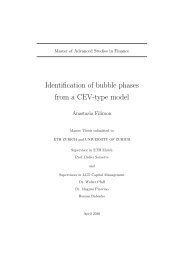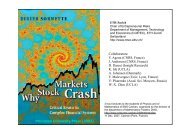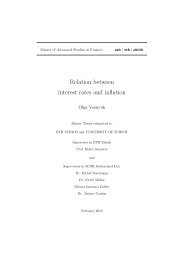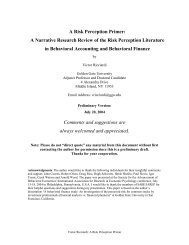Tail Dependence - ETH - Entrepreneurial Risks - ETH Zürich
Tail Dependence - ETH - Entrepreneurial Risks - ETH Zürich
Tail Dependence - ETH - Entrepreneurial Risks - ETH Zürich
Create successful ePaper yourself
Turn your PDF publications into a flip-book with our unique Google optimized e-Paper software.
4.17 Establishing bias and error bars of ˆ β calculated by all data and effect on<br />
ˆλ +,− estimated by applying the non-parametric approach according to<br />
Sornette & Malevergne to 1000 synthetic samples consisting of N = 2507<br />
data points. The bias is calculated by comparing mean values ˆ β all data<br />
and ˆ λ +,−<br />
( ˆ βalldata) to original values denoted by βorig and corresponding<br />
tail dependence estimator ˆ λ +,− (βorig) and for the estimation of error bars<br />
standard deviation ’std’ and 95% quantiles of the estimates are provided.<br />
Relative bias (’rel.bias’) is calculated as percentage of ˆ λ +,−<br />
(βorig). <strong>Tail</strong><br />
indexes α were set equal to three to avoid a second source of error and<br />
’inf’ means ·/0. . . . . . . . . . . . . . . . . . . . . . . . . . . . . . . . 150<br />
4.18 Establishing bias and error bars of ˆ βSI 2 calculated by second β-smile<br />
condition: � Y ≥ Y (k) � and effect on ˆ λ +,− estimated by applying the<br />
non-parametric approach according to Sornette & Malevergne to 1000<br />
synthetic samples consisting of N = 2507 data points. The bias is cal-<br />
culated by comparing mean values ˆ β alldata and ˆ λ +,−<br />
( ˆ βalldata) to original<br />
values denoted by βorig and corresponding tail dependence estimator<br />
ˆλ +,− (βorig) and for the estimation of error bars standard deviation ’std’<br />
and 95% quantiles of the estimates are provided. <strong>Tail</strong> indexes α were set<br />
equal to three to avoid a second source of error and ∗ means that relative<br />
bias (’rel.bias’) calculated as percentage of ˆ λ +,−<br />
(βorig) ≥ 100%. . . . . . 151<br />
4.19 Establishing bias and error bars of ˆν and ˆb γ n , estimated for 1000 synthetic<br />
samples consisting of N = 2507 data points. The bias is calculated by<br />
comparing mean values ˆν and ˆb γ<br />
n to original values denoted by α and for<br />
the estimation of error bars standard deviation ’std’ and 95% quantiles<br />
of the estimates are provided. Relative bias (’rel.bias’) is calculated as<br />
percentage of α. . . . . . . . . . . . . . . . . . . . . . . . . . . . . . . . 152<br />
4.20 Establishing bias and error bars of ˆ λ +,− (ˆν, ˆ βalldata) with ˆ β calculated by<br />
all data and ˆ λ +,− (ˆν, ˆ βSI2) with ˆ β calculated by second β-smile condition:<br />
� Y ≥ Y (k) � by applying the non-parametric approach according<br />
to Sornette & Malevergne to 1000 synthetic samples consisting of<br />
N = 2507 data points. The bias is calculated by comparing mean<br />
values ˆ λ +,−<br />
(ˆν, ˆ βalldata) and ˆ λ +,−<br />
(ˆν, ˆ βSI 2) to original values denoted by<br />
ˆλ +,−<br />
(α, βorig) and for the estimation of error bars standard deviation<br />
’std’ and 95% quantiles of the estimates are provided. ∗ means that<br />
relative bias (’rel.bias’) calculated as percentage of ˆ λ +,−<br />
4.21 Comparison of estimates by non-parametric estimators ˆ λ·,m, ˆ λ<br />
(βorig) ≥ 100%. 153<br />
·,m<br />
cording to Schmidt & Stadtmüller, and ˆχ +,− according to Poon, Rockinger,<br />
and Tawn with ˆ λ +,− (βalldata) according to Sornette & Malevergne by<br />
applying the different concepts to 1000 synthetic samples consisting of<br />
N = 2507 data points created by different βorig. For the estimation of<br />
error bars standard deviation ’std’ and 95% quantiles of the estimates<br />
are calculated and for ˆχ +,− the proposed standard deviation ˆσ is given<br />
for comparison. <strong>Tail</strong> indexes α were estimated by the Hill estimator. . . 155<br />
EV T<br />
ac








